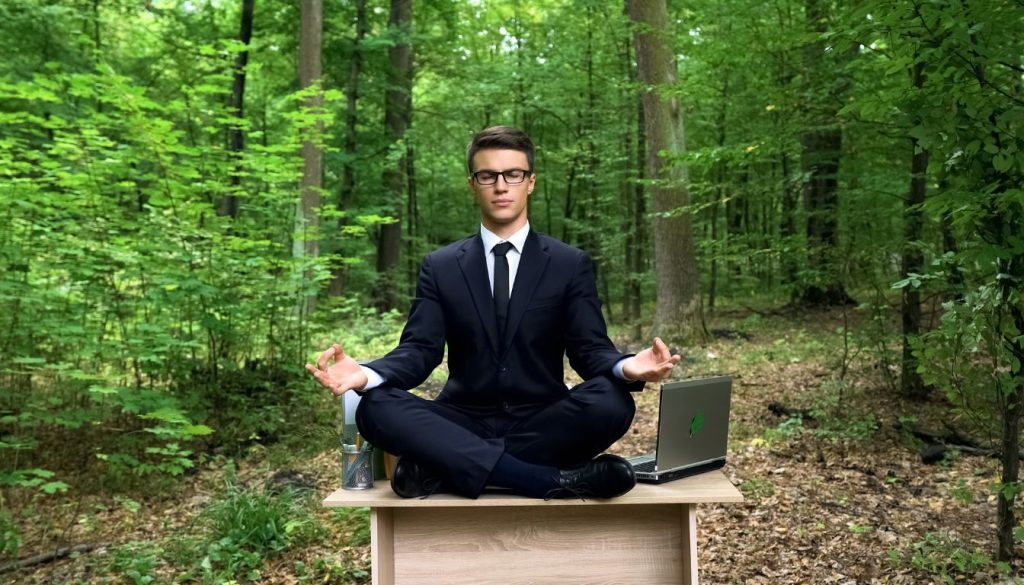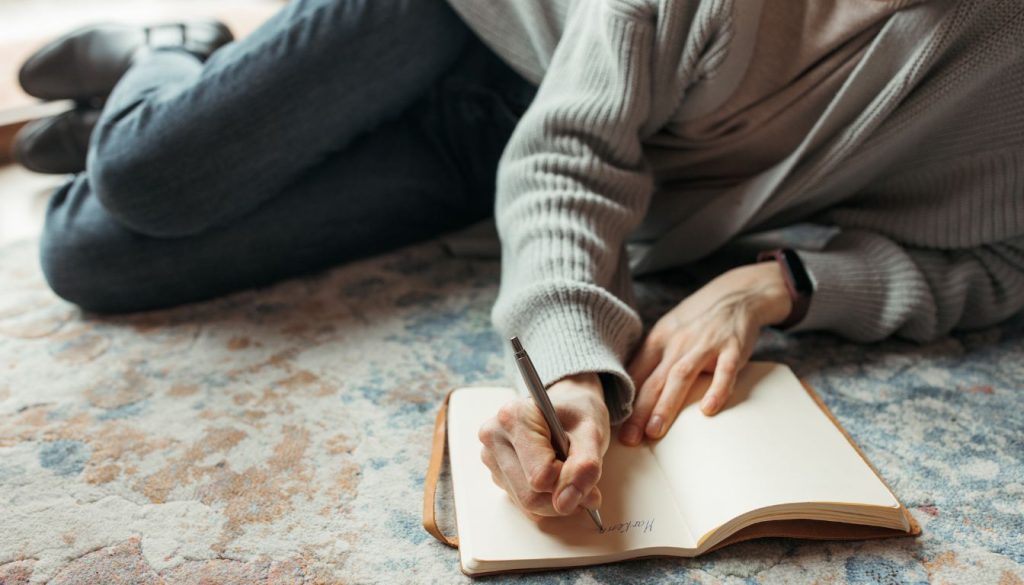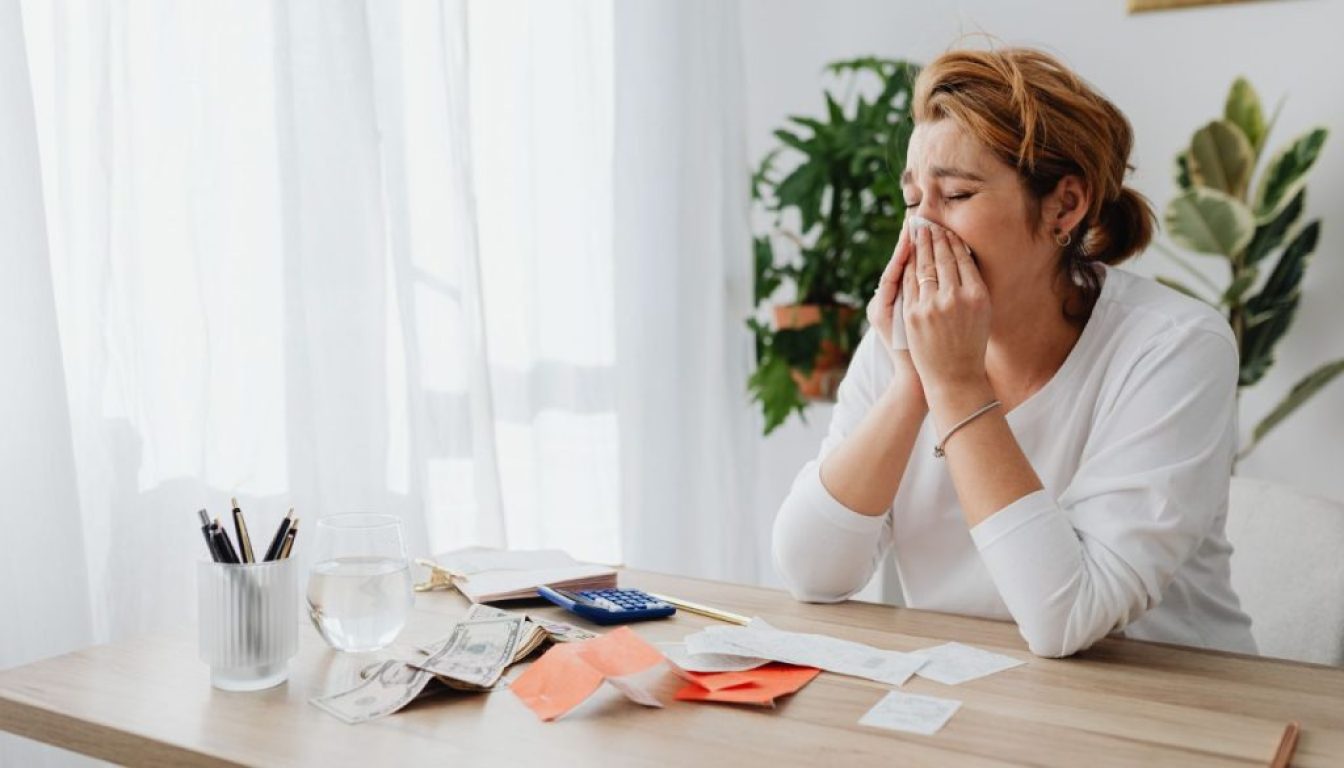Managing anxiety: Your Ultimate Guide for Daily Life
Are you often feeling worried or restless? Many people face these feelings every day.
Anxiety issues are very common, affecting millions around the world.
So, what exactly is anxiety, and what are practical tips for managing anxiety effectively?
Anxiety is a stress response, but daily life suffers when it’s too much and doesn’t stop.
There are different types of anxiety disorders, like social anxiety and panic disorders.
Knowing the signs, such as a fast heartbeat and trouble focusing, is the first step to help.
In this article, you’ll learn why anxiety happens, its signs, and how to deal with it daily.
Even if you have anxiety from time to time or you’ve been diagnosed with it, remember there’s always a chance for a calmer, more satisfying life.
Key Takeaways
- Anxiety is a common and natural response to stress.
- Excessive and persistent anxiety may indicate an anxiety disorder.
- Knowing the signs and symptoms of anxiety is important for effective management.
- Lifestyle changes can significantly impact anxiety levels.
- Coping strategies can provide immediate relief during anxious moments.
- Professional treatment options are available for those with anxiety disorders.
What is Anxiety?
Anxiety is your body’s reaction to stress.
When it’s too much and stays for a long time, it’s called an anxiety disorder.
These disorders are very common, affecting about 40 million Americans.
They can cause persistent and excessive worry in people.
Feeling excessive fear and having worried thoughts are signs of anxiety.
It can also make your heart race. Intense fear can cause you to avoid doing things you love.
Usually, these problems start when you’re young.
They happen more to women than to men.
Common Causes and Symptoms of Anxiety
Genetic and environmental factors might cause anxiety disorders.
Bad events can also trigger anxiety in adults.
For example, health conditions like thyroid or heart issues and the use of drugs or alcohol are risk factors that can make anxiety worse.
How to Recognize the Symptoms of Anxiety Disorders
If you have generalized anxiety disorder (GAD), you might feel:
- Restless
- Difficulty concentrating
- Difficulty in sleeping
- Tired
- Easily annoyed
- Aches
- Stomach problems
Panic disorder means having lots of sudden panic attacks.
Your heart might race, you could sweat, and you might feel like something is very wrong.
Social anxiety disorder, also called social phobia, can make you scared of other people watching you or judging you.
It might make your face or neck turn red.
You might avoid looking directly at people or feel very self-conscious.
Phobias they’re strong fears of certain things or places.
They make people avoid those things, even when it makes no sense.
Separation anxiety disorder is being afraid to be away from people you love.
It makes you avoid being by yourself.
Spotting the symptoms of anxiety and other anxiety disorders early is important to prevent your health from getting worse over time.
Anxiety disorders can make other health problems show up, too.
It is necessary to talk to a mental health expert if you think you or someone you know is dealing with anxiety.
They can offer the right diagnosis, treatment, and stress management plan.
What are Anxiety Triggers?
What causes anxiety can be different for everyone. Knowing what makes you anxious is key to handling it better.
Finding out what makes you tense can teach you the best stress management techniques and ways to calm down.
This can help you feel less stressed each day.
Here are some common triggers for anxiety:
- Big life changes
- Fights at work
- Money problem
- Being in social spots, especially if you worry much about what others think
- Too much caffeine
- Not enough sleep
- Some medicines
- Worry about health or certain health conditions
- Switching up your daily habits
- Starting a new job can sometimes make you anxious
If you drink too much coffee, it can increase your anxiety and even cause panic attacks if you have a panic disorder.
A study in Australia found that energy drinks raised anxiety in young men but not in women.
How to Manage Anxiety
1. Keeping an Anxiety Journal
Writing an anxiety journal can help.
Note the times you feel most worried or scared and where you are.
This lets you see what leads to your anxiety.
- Record the date and place each time you feel overly anxious or fearful.
- Explain what happened or what you did when you started feeling anxious.
- Write down any changes like fast heartbeats, trouble focusing, or sweating.
- Think about what you were thinking and how you felt right then.
As you write more, you might notice trends. These can show you what your biggest triggers are and general risk factors.
Then, you’ll know better how to deal with them and might even get help from a mental health professional to work through them.
According to the Anxiety and Depression Association of America, there are about 40 million anxious people in the U.S.
You can lower how much anxiety impacts your life and feel happier by spotting your triggers and getting help through therapy or coping skills.
2. Lifestyle Changes in Managing Anxiety
Managing anxiety well needs many steps. Making lifestyle changes is key to helping lower symptoms and mental disorders.
Regular exercise, eating well, and sleeping right can make you feel better.
They help reduce anxiety symptoms and boost your health overall.
Start with simple steps like walking or eating more fruit and veggies.
3. Regular Exercise
Exercise is great for fighting anxiety. Just 30 minutes several times a week can make a difference.
It makes your body release endorphins, natural chemicals that make you feel good.
Find an exercise you love, such as biking, dancing, or playing a team sport.
This will make adding exercise to your life easier.
4. Maintaining a Healthy Diet
What you eat has a big effect on how you feel.
A diet with many fruits, veggies, and lean proteins helps manage anxiety.
This way, eating protein at breakfast can help you stay full longer.
This keeps your energy steady. Carbs can also calm you down, increasing the serotonin in your brain.
Don’t forget to drink enough water. Mild dehydration can change your mood.
But, some foods and drinks can make anxiety symptoms worse. Alcohol, caffeine, and certain drugs should be avoided. These can affect your sleep and make anxiety symptoms stronger.
5. Establishing a Consistent Sleep Schedule
Good sleep is vital for handling anxiety. Ensure you get eight hours of sleep a night.
Having a regular sleep schedule is also important.
It keeps your body clock in check and makes your sleep better.
Stick to bedtime and wake-up time every day. Making your bedroom a quiet, cozy place can help. Reading or taking a bath before bed can relax you.
Improving your sleep routine, getting support from friends, and using stress reduction techniques can help with anxiety.
Remember, eating well and exercising are good, but they’re not all you need for treatment.
It shows that a mix of healthy ways of living can lower the chances of mental problems. This means that taking care of yourself is the best way to deal with anxiety.
Effective Coping Strategies for Anxiety Relief

Good coping strategies can help a lot in managing stress and fear.
You can use them to ease moments of fear, chest tightness, or excessive emotion.
Thus, you can find your calm and balance again.
1. Deep Breathing Exercises
Deep breathing is easy and works great for anxiety.
It helps calm you down when you’re tense.
Anxiety makes your breath short and fast, worsening how you feel.
Deep breathing will slow your heart, relax your body, and help you focus better.
Try breathing in for four seconds, holding for two, and then out for six seconds. Rinse and repeat until your anxiety goes away.
2. Mindfulness and Meditation Techniques
Mindfulness and meditation are beneficial for managing anxiety.
They teach you to stay in the now and watch your thoughts and feelings calmly.
This awareness lets you notice your emotions better and not let them control you.
The RAIN technique is great for this.
3. Grounding Techniques for Anxiety Attacks
Do you feel a panic attack coming? Grounding techniques help you release worry and enter the present.
The 5-4-3-2-1 method is good for this.
Name five things you see, four you can touch, three you hear, two scents, and one taste.
It helps distract from anxiety and keeps you in control.
Remember, each person’s anxiety is unique.
So, what helps me may not help you.
Try different strategies to see what works for you.
Sticking to your chosen methods is important for managing your anxiety, whether you feel anxious or not.
How to Build a Support System
A strong support system is key for dealing with anxiety disorders.
Your network offers understanding, encouragement, and strategies.
It’s important to talk to loved ones and find people who understand.
Talk to Loved Ones
Opening up to loved ones about your anxiety is essential.
It makes you feel less alone and offers comfort.
Social support is known to help with stress.
It can protect you from harmful effects of stress.
Talking about your anxiety with others lets them support you better.
Join Support Groups
Support groups are also great for those with anxiety disorders.
They connect you with people facing similar challenges.
These spaces are for sharing strategies and experiences.
Social support is linked to better mental health.
For example, it helps with PTSD in survivors of childhood sexual abuse.
| Type of Support | Benefits |
|---|---|
| Emotional Support | Provides comfort, understanding, and encouragement |
| Informational Support | Offers advice, guidance, and resources for managing anxiety |
| Tangible Support | Assists with practical tasks and responsibilities |
| Social Companionship | Engages in shared activities and experiences, reducing feelings of isolation |
Joining a support group gives you many types of support for managing anxiety.
You gain insights, strategies, and a sense of belonging.
These help you manage your anxiety better.
Building a solid support system is not easy but very rewarding.
It helps your mental health and well-being.
Reach out to loved ones and join support groups.
This creates a supportive network for handling your anxiety.
Cognitive Behavioral Therapy (CBT) for Anxiety

Cognitive behavioral therapy, or CBT, helps a lot with anxiety disorders.
Around 1 in 3 people in the US face anxiety at some point.
CBT is an effective tool for helping someone with this issue.
Clients learn to challenge and change their negative thoughts in CBT.
This helps them think more clearly and realistically.
Studies show CBT is very good at dealing with different types of anxiety.
How CBT Works
Sessions are usually 45–60 minutes long and occur once a week. Thus, people spend very little time in therapy each week.
In CBT, they work to change bad thoughts and actions that make anxiety worse. This includes:
- Spotting negative thinking
- Questioning thoughts that don’t make sense
- Learning how to handle stress
- Slowly facing fears to get better
CBT’s exposure part helps people get used to things that scare them. Gradually, they get better at dealing with their fears.
How to Find a Qualified CBT Therapist
Getting the right treatment and choosing the right CBT therapist is important for managing anxiety.
Look for someone who is trained and has worked with anxiety.
Consider these points:
- Pick a therapist with the right CBT training
- Ask how much they’ve helped others with anxiety
- Make sure their treatment style fits what you need
- Feel if you connect well with them
Research supports CBT as a great way to treat anxiety, including OCD and social anxiety. It’s been shown to work well even in primary care.
| Anxiety Disorder | CBT Effectiveness |
|---|---|
| Generalized Anxiety Disorder | 71% of people less worried and anxious |
| Social Anxiety Disorder | Better than medicines |
| Specific Phobias | Good for treating phobias |
| Obsessive-Compulsive Disorder | Studies show it works well |
By teaming up with a skilled CBT therapist, people with anxiety disorders can greatly improve their lives.
They’ll help you handle your anxiety and live better.
Medication for Treating Anxiety
An estimated 300 million people, about 4% of the world, faced anxiety disorders in 2019.
Unfortunately, up to 75% of people worldwide didn’t get any care.
Medication is key in treating mental health conditions and anxiety disorders.
It’s often mixed with therapy.
Types of Anti-Anxiety Medications
1. Benzodiazepines are quick-acting but risky
It is bad to stop taking them at once
They come with serious FDA warnings for their dangers. Misusing them can lead to overdose or death.
2. Antidepressant medications like SSRIs are a common choice.
Citalopram (Celexa), escitalopram (Lexapro), and others are used.
They need a month and more to start working.
There are more drugs for anxiety treatment.
3. Tricyclic antidepressants help but have side effects.
4. MAOIs have more risks than newer ones.
4. Drugs from other classes, like antihistamines and beta-blockers, also help with anxiety.
Potential Side Effects and Risks
The side effects of anxiety disorder drugs vary. They might make you sleepy or dizzy.
Benzodiazepines can be needed for sudden anxiety but should be watched for addiction.
Buspirone is an option with less risk of dependence.
It is important to talk to your doctor when treating anxiety.
They’ll determine the right medications for you and consider your needs and history to recommend best.
Working together helps manage side effects and ensures the drugs are used safely.
Natural Remedies for Anxiety

Medication and therapy are key in treating anxiety disorders.
Yet, some find additional help in natural remedies and alternative therapies to relieve symptoms.
These can lessen anxiety disorder symptoms and improve well-being.
Many find herbal supplements useful.
For instance, Chamomile aids with generalized anxiety disorder.
Valerian root and passionflower may also reduce anxiety.
Remember, talk to a doctor before adding supplements to check for safety and drug interactions.
Studies show meditation eases anxiety.
Yoga mixes postures, breathing, and meditation, lessening anxiety.
High-intensity exercise might be better than low-intensity exercise at reducing anxiety.
Acupuncture, from Chinese medicine and massage therapy, can help with anxiety.
Both aim to relax and reduce tension due to overwhelming worry.
There are more therapies worth exploring:
- Lavender in aromatherapy is said to help with anxiety
- Writing about feelings could improve well-being, a study says
- Weighted blankets can lower anxiety levels
- CBD oil from hemp, without THC, shows promise in reducing anxiety
These approaches help but are not replacements for professional care, especially in severe cases.
In the U.S., more than 19% of adults face anxiety yearly.
Always get medical help for chronic, highly impacting anxiety or if danger is felt.
Finding the right anxiety management is unique for everyone. Working with a mental health expert is key. They can blend traditional and additional methods to find the best plan for you.
Managing Anxiety in the Workplace

Anxiety can greatly impact how well you do at work and how happy you are.
It’s important to learn to deal with work anxiety.
A study found that 83% of people felt emotionally exhausted from work, and 85% said work stress hurt their mental health.
If you’re anxious at work, you might feel okay at night but stressed in the morning.
You may even feel sick or be unable to concentrate on tasks.
Other signs include:
- Losing motivation
- Putting off work
- Avoiding work events
Talking to your boss about your anxiety can help.
The Americans with Disabilities Act (ADA) protects people with anxiety at work.
It says you should get help to do your job if needed.
You might talk about working flexible hours or having quiet places to relax.
You could also ask for help with organizing your tasks better.
How to Create a Stress-Free Work Environment
It’s important to make your work area less stressful.
You can clear away clutter and stick to a schedule.
It’s also good to take short breaks for deep breathing or meditation.
Planning your day can help lower stress, too.
Many things at work can make you anxious.
Here are some examples:
- Tight deadlines
- Feeling like you’re not as good as others
- Not getting along with co-worker
- Bad bosses
- Feeling like your work doesn’t matter
- Workplaces with bad atmospheres
- Unrealistic goals
- Not enough staff
- High competition
- Not enough training
- No extra pay for working more
- Ignoring health and safety also adds to anxiety
Knowing what makes you anxious is good, and working on those fears to cope with them is good.
Take small breaks, exercise, organize your tasks, and set some limits.
It can also help you laugh and make your workspace a calming place.
| Workplace Anxiety Symptoms | Strategies for Managing Anxiety |
|---|---|
| Feeling better at night but worse in the morning | Identify triggers and focus on core fears |
| Physically feeling ill when thinking about work | Be gentle with yourself and take micro-breaks |
| Difficulty focusing on tasks and shrinking motivation | Exercise, get organized, and set boundaries |
| Procrastination and avoiding work-related events | Find humor and create a soothing workspace |
Employers can make the workplace better for mental health. They can offer things like Employee Assistance Programs (EAP), discounts for gyms, and classes to learn new skills.
If stress becomes too much and starts affecting your work a lot, it could be an anxiety disorder.
It’s key to manage stress, maybe by not working at home and taking breaks. Enjoy your achievements, and plan breaks to refresh and be more productive.
If anxiety is a big issue for you, don’t hesitate to get help. Therapy and sometimes medication can make a difference. Keep talking to your boss and try to keep your work area calm.
Using good coping methods helps you manage your anxiety and feel better overall.
Wrapping Up
Treating anxiety is different for everyone. Know what makes you anxious and change your lifestyle.
Also, find ways to relax and see a therapist if needed.
This helps you handle your anxiety.
Healing takes time, and it’s okay to have setbacks.
To avoid quick conclusions, think back on wrong ideas and get help from a mental health expert to make a plan that fits your needs.
Being proactive in your treatment helps you regain control of your life, leading to a more peaceful and joyful life.
FAQ
What are the common causes of anxiety?
Common causes of anxiety can be both from your genes and things around you. It’s about the chemicals in your brain, what you’ve been through, and how your life looks right now.
What are the physical symptoms of anxiety?
Feeling anxious might show in your body through things like a fast heart, lots of sweat, or feeling shaky. You might find it hard to catch your breath or get a headache too.
How can I identify my anxiety triggers?
To know what triggers your anxiety, try keeping a journal. Write when you feel anxious and note what’s going on then. Look for patterns and think about what might be causing it, like changes in your life.
What lifestyle changes can help manage anxiety?
Changing your daily habits can help with anxiety. This includes exercising often, eating well, sleeping on a schedule, and staying away from stimulants like caffeine and alcohol.
What are some effective coping strategies for anxiety relief?
For dealing with anxiety, try deep breathing, mindfulness, or meditation. Grounding techniques during anxiety attacks can also be very useful.
How can Cognitive Behavioral Therapy (CBT) help with anxiety?
Cognitive Behavioral Therapy (CBT) works by helping you spot and fight off bad thoughts that make you anxious. It helps you think more clearly and build skills to handle your fears.
What types of medications are used to treat anxiety disorders?
Anxiety meds include fast-acting ones like benzodiazepines, but they can be addictive. Antidepressants are also used. SSRIs and SNRIs can be good for the long run.
Are there any natural remedies or alternative therapies for anxiety?
Yes, some people find relief from anxiety in natural ways. This can be through herbs like chamomile or practices like yoga, acupuncture, and massage.
How can I manage anxiety in the workplace?
To handle work anxiety, talk to your boss about your needs. Create a calm workspace. Use stress-busting tips during your day.
When should I seek professional help for anxiety?
If anxiety makes you worry a lot, avoid things you’re scared of, or if it starts to really mess with your life, then it’s time to get help from a professional.




